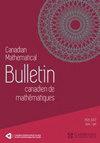拉马努金型系列,重访
IF 0.4
4区 数学
Q3 MATHEMATICS
Canadian Mathematical Bulletin-Bulletin Canadien De Mathematiques
Pub Date : 2023-10-05
DOI:10.4153/s0008439523000772
引用次数: 0
摘要
在本文中,我们重新讨论$\frac {1}{\pi }$的ramanujan型级数,并说明它们是如何从与$\mathrm {SL}_{2}(\mathbb {Z})$可通约的$\mathrm {SL}_{2}(\mathbb {R})$的属零子群中产生的。作为说明,我们重现了拉马努金对于$\frac {1}{\pi }$的惊人公式和Cooper等人最近的结果,并为$\frac {1}{\pi }$导出了一个新的有理拉马努金型级数。作为副产品,我们得到了一个一般意义上的clausen型公式,并得到了一个与上述拉马努金公式密切相关的clausen型二次变换公式。本文章由计算机程序翻译,如有差异,请以英文原文为准。
Ramanujan type series for , revisited
Abstract In this note, we revisit Ramanujan-type series for $\frac {1}{\pi }$ and show how they arise from genus zero subgroups of $\mathrm {SL}_{2}(\mathbb {R})$ that are commensurable with $\mathrm {SL}_{2}(\mathbb {Z})$ . As illustrations, we reproduce a striking formula of Ramanujan for $\frac {1}{\pi }$ and a recent result of Cooper et al., as well as derive a new rational Ramanujan-type series for $\frac {1}{\pi }$ . As a byproduct, we obtain a Clausen-type formula in some general sense and reproduce a Clausen-type quadratic transformation formula closely related to the aforementioned formula of Ramanujan.
求助全文
通过发布文献求助,成功后即可免费获取论文全文。
去求助
来源期刊
CiteScore
1.30
自引率
0.00%
发文量
68
审稿时长
24 months
期刊介绍:
The Canadian Mathematical Bulletin was established in 1958 to publish original, high-quality research papers in all branches of mathematics and to accommodate the growing demand for shorter research papers. The Bulletin is a companion publication to the Canadian Journal of Mathematics that publishes longer papers. New research papers are published continuously online and collated into print issues four times each year.
To be submitted to the Bulletin, papers should be at most 18 pages long and may be written in English or in French. Longer papers should be submitted to the Canadian Journal of Mathematics.
Fondé en 1958, le Bulletin canadien de mathématiques (BCM) publie des articles d’avant-garde et de grande qualité dans toutes les branches des mathématiques, de même que pour répondre à la demande croissante d’articles scientifiques plus brefs. Le BCM se veut une publication complémentaire au Journal canadien de mathématiques, qui publie de longs articles. En ligne, il propose constamment de nouveaux articles de recherche, puis les réunit dans des numéros imprimés quatre fois par année.
Les textes présentés au BCM doivent compter au plus 18 pages et être rédigés en anglais ou en français. C’est le Journal canadien de mathématiques qui reçoit les articles plus longs.

 求助内容:
求助内容: 应助结果提醒方式:
应助结果提醒方式:


